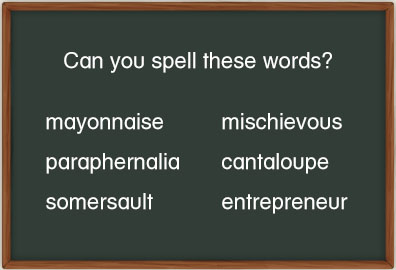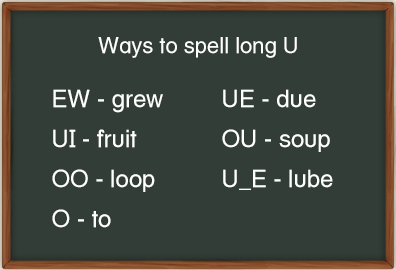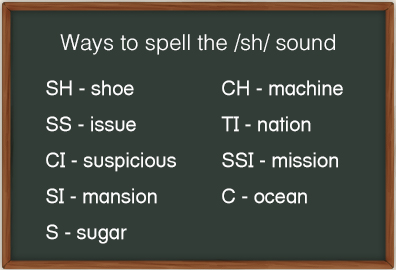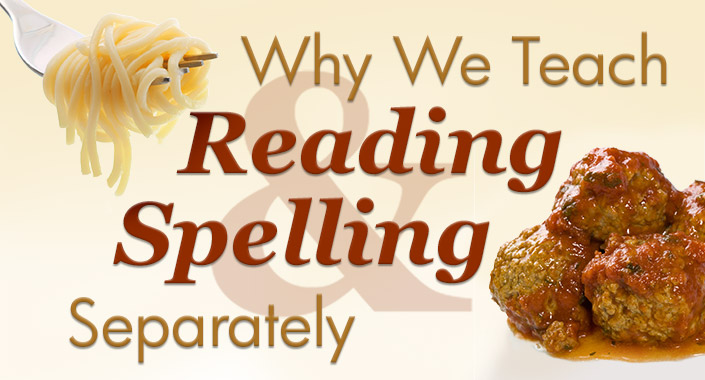Taken from http://blog.allaboutlearningpress.com/why-we-teach-reading-and-spelling-separately/
Some things just go together.
You know…like spaghetti and meatballs, salt and pepper, and Snoopy and Woodstock.
Or like reading and spelling.
But wait…should reading and spelling really be taught together? As strange as it may seem…
I recommend that reading and spelling not be taught in the same lesson.
Would you like to know why?
First, reading is easier than spelling.
Most children learn to read much more quickly than they learn to spell. Simply put, reading is easier than spelling. Need proof? Read the words below.

You didn’t have any trouble reading them, did you? But what if I asked you to spell them? (Without looking first, of course!) How would you do? If you think you would have gotten all of these words correct, congratulations! You’re probably a better speller than most adults. Though most adults can easily read these words, many would misspell them.
The same is true for your child. Reading age-appropriate words like animal and wear is usually mucheasier than spelling them. And herein lies the challenge.
There are more than 250 ways to spell the 45 sounds in the English language.
Spelling would be much easier if the sounds were always spelled the same way. But though the English language contains just 26 letters, these letters combine to create 45 speech sounds. And to complicate the matter even more, there are over 250 ways to spell those sounds.
For example, the sound of /j/ can be spelled J (jiggle), G (gym), DGE (badge), or D (gradual).
But that’s just the beginning. Think about the sound of long U and all the ways that it can be spelled.

And the sound of /sh/ can be spelled with all these combinations.

All these combinations can make words that are easy to read difficult to spell. For example, with a basic understanding of phonics, a child should be able to decode the word special without much trouble. Butspelling the word special may present a young student with a greater challenge.
Is it spelled speshul, just like it sounds?
Or is it spetial like martial?
Or should it be spelled spesial with the same word ending as controversial?
See what I mean? Is it any wonder that so many children (and adults!) struggle with spelling? With so many possible spellings for each sound, the best you can do is to visually recognize the correct spelling and practice. And practice. And then practice some more.
So now we understand that learning to spell is harder than learning to read. And that leads us to the second reason that we teach spelling and reading separately.
If you teach reading and spelling together, one or the other will be sacrificed.
Teaching spelling and reading of the same words in the same time frame guarantees only one thing: one of these critically important subjects will fall by the wayside. There are two possible scenarios.
Scenario #1: Your child learns to read the words in the lesson, but he can’t move on because he’s still learning to spell them. (Remember, it takes longer to learn to spell the words than it does to read them.) You’ve chosen to focus on spelling at the expense of reading.

Scenario #2: Your child learns to read the words in the lesson. Though he’s still learning to spell the words, you decide to allow him to move on to the next lesson. You’ve chosen to focus on reading, so your child’s spelling suffers.

As you can see, no matter what you decide, it’s a no-win situation. Both scenarios force you to choose one subject to the detriment of the other.
At All About Learning Press, we don’t believe you should have to sacrifice your children’s learning. Fortunately, there is a third scenario.
Teach reading and spelling separately and your child will benefit.
When you teach reading and spelling separately, your child can succeed at BOTH subjects.
He can progress as quickly as possible in reading…

…and he can take as much time as he needs in spelling.

And then you can enjoy them together.
Like spaghetti and meatballs.
Do you think that teaching reading and spelling separately would make a difference for your kids?

